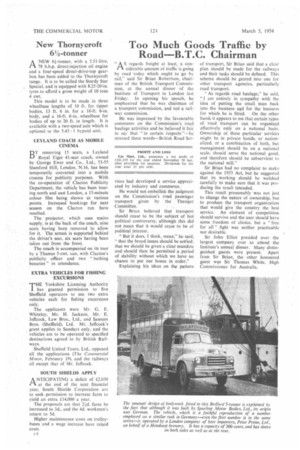Too Much Goods Traffic by Road—B.T.C. Chairman
Page 42

If you've noticed an error in this article please click here to report it so we can fix it.
" A Sregards freight at least, a con siderable amount of traffic is going by road today which ought to •go by rail," said Sir Brian Robertson, chairman of the British Transport Commission, at the annual dinner of the Institute of Transport in London last Friday. In opening his speech, he emphasized that he was chairman of a transport commission, and not a railway commission.
He was impressed by the favourable comments on the Commission's road haulage activities and he believed it fair to say that "in certain respects "—he stressed these words—British Road Ser vices had developed a service appreciated by industry and commerce.
He would not embellish the judgment on the Commission's road passenger transport given by the Thesiger Committee.
Sir Brian believed that transport should cease to be the subject of hot political controversy, although this did not mean that it would cease to be of political interest.
" But it does. I think, mean," he said, " that the broad issues should be settled; that we should be given a clear mandate and should then be permitted a period of stability without which we have no chance to put our house in order."
Explaining his ideas on the pattern of transport, Sir Brian said that a clear plan should be made for the railways and their tasks should be defined. This scheme should be geared into one for other transport agencies, particularly road transport.
"As regards road haulage," he said, "I am entirely in sympathy with the idea of putting the small man back into the business aod for the business
for which he is fitted. On the other hand,-it appears to me that certain types of 'road transport can be organized effectively only on a national basis. Ownership of these particular services might be in private hands,• or nationalized, or a combination of both, but management should be on a national scale, should serve the national good, and therefore should be subservient to the national will."
Sir Brian had no complaint to make against the 1953 Act, but he suggested that its working should be watched carefully to make sure that it was producing the result intended.
This result presumably was not ilia to change the nature of ownership, but to produce the transport organization that would give the country the best service. An element of competition should survive and the user should have some ,freedom of' choice, but a "free for all" fight was neither practicable nor, desirable.
Sir John Elliot presided over the largest company ever to attend the Institute's annual dinner. Many distinguished guests were present. Apart from Sir Brian, the other honoured guest was Sir Thomas White, High Commissioner for Australia.




































































































